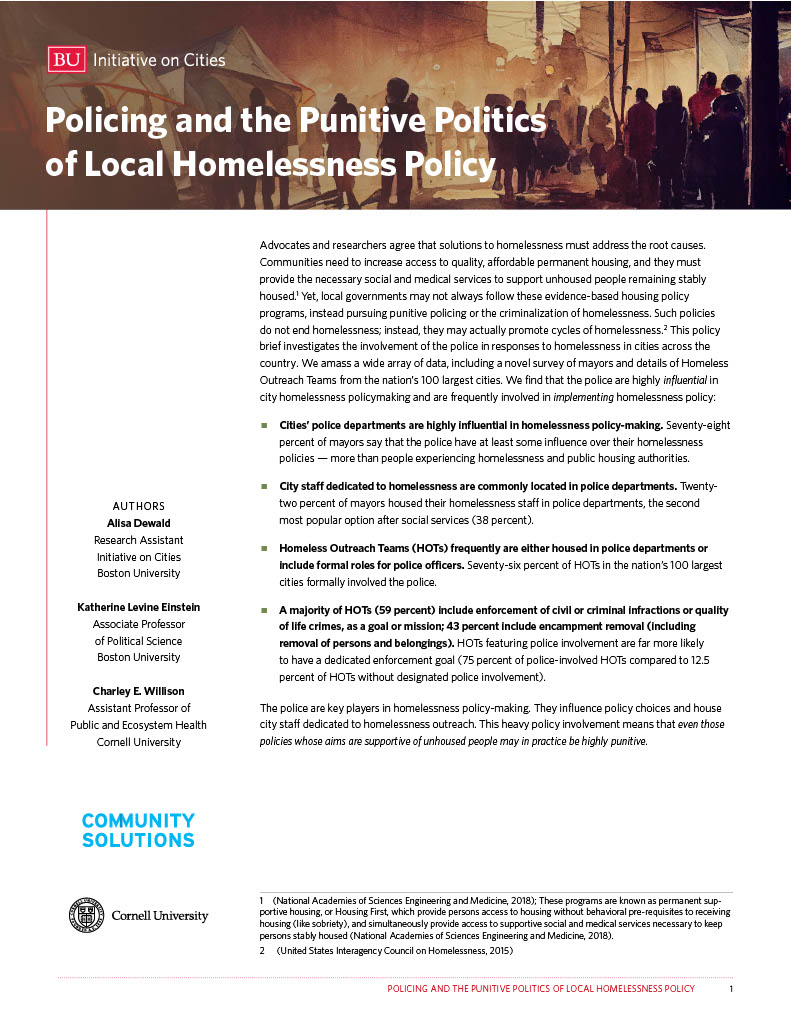Policy Brief: Policing and the Punitive Politics of Local Homelessness Policy
Authors: Alisa Dewald (Research Assistant; Boston University Initiative on Cities), Dr. Katherine Levine Einstein (Boston University Initiative on Cities; Department of Political Science), and Dr. Charley Willison (Cornell University Public Health)
In this brief, the Boston University Initiative on Cities, Cornell University, and Community Solutions investigate the involvement of the police in responses to homelessness in cities across the country.
 Advocates and researchers agree that solutions to homelessness must address the root causes. Communities need to increase access to quality, affordable permanent housing and provide the necessary social and medical services to support unhoused people remaining stably housed. Yet, local governments may not always follow these evidence-based housing policy programs, instead pursuing punitive policing or the criminalization of homelessness. Such policies do not end homelessness and may actually promote cycles of homelessness.
Advocates and researchers agree that solutions to homelessness must address the root causes. Communities need to increase access to quality, affordable permanent housing and provide the necessary social and medical services to support unhoused people remaining stably housed. Yet, local governments may not always follow these evidence-based housing policy programs, instead pursuing punitive policing or the criminalization of homelessness. Such policies do not end homelessness and may actually promote cycles of homelessness.
This policy brief investigates the involvement of the police in responses to homelessness in cities across the country. The authors amass a wide array of data, including a novel survey of mayors and details of Homeless Outreach Teams from the nation’s 100 largest cities. They find that the police are highly influential in city homelessness policymaking and are frequently involved in implementing homelessness policy:
- Cities’ police departments are highly influential in homelessness policy-making. Seventy-eight percent of mayors say that the police have at least some influence over their homelessness policies — more than people experiencing homelessness and public housing authorities.
- City staff dedicated to homelessness are commonly located in police departments. Twenty-two percent of mayors housed their homelessness staff in police departments, the second most popular option after social services (38 percent).
- Homeless Outreach Teams (HOTs) are frequently housed in police departments or include formal roles for police officers. Seventy-six percent of HOTs in the nation’s 100 largest cities formally involved the police.
- A majority of HOTs (59 percent) include enforcement of civil or criminal infractions or quality-of-life crimes as a goal or mission; 43 percent include encampment removal (including removal of persons and belongings). HOTs featuring police involvement are far more likely to have a dedicated enforcement goal (75 percent of police-involved HOTs compared to 12.5 percent of HOTs without designated police involvement).
The police are key players in homelessness policy-making. They influence policy choices and house city staff dedicated to homelessness outreach. This heavy policy involvement means that even those policies whose aims are supportive of unhoused people may, in practice, be highly punitive.
View the Full Policy BriefNews
June 5, 2023: American City and County: Report: Police response to homelessness is inherently punitive
June 7, 2023: Smart Cities Dive: ‘Street crisis team’ aims to curb police involvement in homelessness response in San Francisco